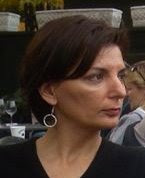Webster defines it as follows:
Main Entry: mu·sic
Pronunciation: \ˈmyü-zik\
Function: noun
Usage: often attributive
Etymology: Middle English musik, from Anglo-French musike, from Latin musica, from Greek mousikē any art presided over by the Muses, especially music, from feminine of mousikos of the Muses, from Mousa Muse
Date: 13th century
1 a : the science or art of ordering tones or sounds in succession, in combination, and in temporal relationships to produce a composition having unity and continuity b : vocal, instrumental, or mechanical sounds having rhythm, melody, or harmony
2 a : an agreeable sound : euphony music to my ears> b : musical quality music of verse>
3 : a musical accompaniment music>
4 : the score of a musical composition set down on paper
5 : a distinctive type or category of music music for everybody — Eric Salzman>
But that doesn’t explain what it is. I began to think about this (not music, I think about it all of the time) after I discovered Blip.fm.
Almost giddy, I signed up as Mixin’ Maria – that’s the DJ name I selected. Check out all of my selections here or look at the end of this post for the first 18 of them.
So back to the definition.
As I carefully made my selections, I was asked if I wanted to add a few words about each song – you blip songs, blip as in a verb to indicate that you’re posting / playing / suggesting a song. So as I set out to spin a few tracks, I had to verbalize what I liked about a song, the singer, and such. While there are songs that I love because of the story they tell, most of the time I like a song because it speaks to me. It moves me. I feel exalted in some way (yes, that is the proper word to use). That’s what music is to me. It’s a connection on some level of which I am totally unaware. It has the capacity to make me feel like few things do. It provides the same joy as love. Crazy perhaps, but true. It opens my heart and I gush.
But that’s selective. There are thousands of bands and songs and compositions that I don’t like. Some are horrible, and I can’t change the channel fast enough. There’s no love there. None lost either. So Webster’s definition as “an agreeable sound” has truth to it, but it’s not accurate. I’m not talking about something that’s “agreeable.” I’m talking about something that makes you want to turn the volume up loud enough to shake the windows, dance in the living room, and use your lung capacity in a way that you can’t in a typical setting. And what’s this about “the science or art of ordering…” -- ? I doubt seriously that Madonna employs scientific methods to create her gyrating tunes. I would guess that it has to do with passion.
All great art is the result of an experience and results in an expression of that experience. That’s not scientific.
All great art is the result of an experience and results in an expression of that experience. That’s not scientific.
So what is music?

